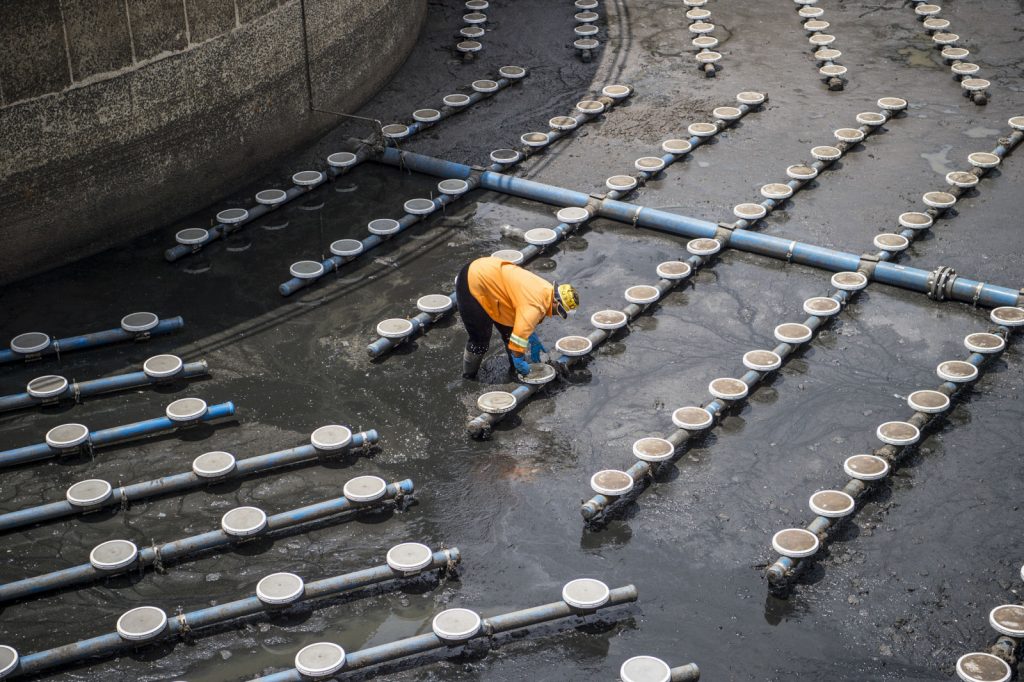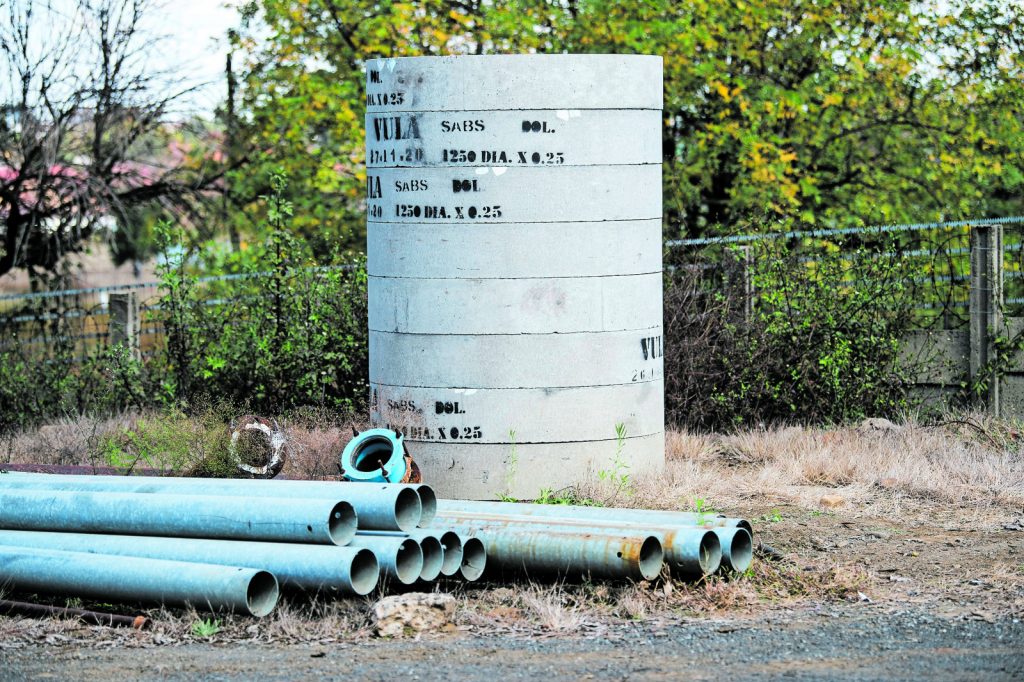The supply of water in numerous municipalities around the country are has been affected by the rolling blackouts. Photo: Delwyn Verasamy
Every day, for the past 10 days, Tracey Whyte has lugged four 20-litre drums of water from her Germiston home to her pre-school in Melville, Johannesburg.
She owns the Melville Education Center in the suburb, where residents have endured weeks of water outages, caused by load-shedding and high water demand, which have depleted Johannesburg Water ’s reservoirs and towers.
The water cuts have been a nightmare for Whyte, whose creche cares for 56 children, including four-month-old babies. “That’s a lot of toilets to flush. We’ve got to cook, wash dishes.
“If the dams were empty, I would accept that, but they’re full. They keep telling us to use as little water as possible but there isn’t any water to use.”
Recovery ‘derailed’
On Tuesday, Joburg Water spokesperson Puleng Mopeli said the recovery of the critically low Commando system – the towers and reservoirs that feed Melville, Hursthill, Brixton and Crosby – had been “derailed” because of Eskom’s reinstatement of load-shedding and high demand in Rand Water’s supply areas.
“Johannesburg Water has since closed the Brixton reservoir to build capacity and pump into the Brixton towers.”
The Honeydew system remains critically low to empty while the Helderkruin reservoir is critically low. Outlet valves are being isolated in some reservoirs by between 50% and 70% to “balance the current high demand with the reduced supply”.
Over the next three years, Mopeli said Joburg Water will invest R340 million to expand the Commando system’s scope and infrastructure “to ensure continuous water supply to the residents of the City of Johannesburg”.
Last week, Rand Water announced stage two water restrictions.
‘Long term reality’
The water shortages are not restricted to pockets of Gauteng. As rolling blackouts intensified in recent weeks, several municipalities in many parts of the country warned how their water supply has been limited because of load-shedding because reservoirs have been unable to fill up.
These water outages are a sign of things to come, said water scientist Anthony Turton. Systems have internal storage capacity, known as a buffer. “When power outages are so regular that the buffer capacity cannot be filled up before the next blackout, then the system is compromised.”
 Standerton Municipality. Raw sewage flows into the Vaal river from the waste treatment plant. Photo: Delwyn Verasamy
Standerton Municipality. Raw sewage flows into the Vaal river from the waste treatment plant. Photo: Delwyn Verasamy
What has unfolded in parts of Gauteng is a “systemic failure”, not an isolated case, he added.
All the country’s municipalities are under severe financial pressure and none “have adequately put back-up plans in place” to counter load-shedding. “All have believed the national government when the president states with confidence that load-shedding will end soon. None have bothered to think that this might be a long-term reality.”
‘Every drop of water pumped uphill’
South Africa is highly reliant on inter-basin transfers, which needs electricity to work. Gauteng’s economy is sustained by constant pumping of water through or over the Drakensberg mountains.
“Every drop has to be pumped through thousands of kilometres of pipes, uphill to power and money … The institutional arrangements needed to sustain water have grown over more than a century, yet have been destroyed in a decade of cadre deployment policy,” Turton said.
Rembu Magoba, a water manager at the CSIR, said water infrastructure relies entirely on Eskom to provide energy. “As a result of load-shedding … many water utilities are struggling to keep up with the water demand because we don’t have water resources that are readily available for human consumption.”
All the country’s water supply must be treated before it is pumped to reservoirs and consumers. “[With] load-shedding, we’re directly impacting on the amount of water that can be produced from these water treatment plants.”
And demand is outstripping supply. “These facilities are already under stress, because as the population increases we’re not increasing the available water supply. We just keep extending the distribution network, adding more villages and communities into the existing network, so at some stage, the water distribution network and the water reservoir network won’t be able to cope with that, let alone the energy crises,” said Magoba.
Most municipalities and water boards “don’t have the capability to generate their own electricity”, he said.
‘Higher stages affect us’
eThekwini metropolitan municipality spokesperson Msawakhe Mayisela said load-shedding is affecting its pump stations, which rely on electricity. “In areas that are most likely to experience water outages, we have temporary measures in place that include the use of water tankers that are sent to affected communities. We are also working closely with the electricity department to exempt those pump stations.”
 Photo: Delwyn Verasamy
Photo: Delwyn Verasamy
The situation is “beyond our control”, he said. “We are proud of the work we have done to mitigate the negative impact to our residents so far. Some of our wastewater treatment works are exempted from load-shedding. Those that are not, have backup generators.”
The City of Tshwane is able to exclude its water installations from load-shedding during stages one to four, said spokesperson Lindela Mashigo. “The unavailability of electricity supply at levels five and six of load-shedding does affect our water pump stations and water installations, which subsequently affects water supply.”
‘We have plans’
Through maintenance, Tshwane is aiming for its Rooiwal power station to “provide its own supply to enable reduction of load-shedding to manageable levels” of stages one to four. The city is also planning to turn to Independent Power Producers (IPPs) for an alternative supply of renewable energy.
“We are preparing to go on request for information in the market for IPPs to come and develop their technology, which will be connected to our network. This is to ascertain which area of our network might need strengthening, depending on potential generations that might come on stream,” he said. This process is at an early phase and one of the challenges is the “financial status of the city”.
Rand Water
Rand Water did not respond to the Mail & Guardian but in a parliamentary reply in March, Water and Sanitation Minister Senzo Mchunu said it had undertaken a comprehensive risk assessment of its power suppliers and their infrastructure. “Rand Water has also embarked on projects to provide emergency power generators at its pumping stations.”
Emergency power provision at the larger booster pumping stations is underway with anticipated completion by the end of next year. “Rand Water is embarking on the installation of hydropower and solar PV at some of its sites. [E]ven though this will provide additional electric energy, it will not be sufficient to supply treatment plants and booster stations due to the size of megawatts that will be generated as well as the geographical locations of installation.”
Innovative ways of generating electricity for Rand Water are “still at very early stages” and the entity continues to depend on Eskom for supply, said Mchunu.
Wastewater risks
Turton said the biggest risk from load-shedding is the accelerated collapse of sewage systems. “The next risk is from pathogens entering the water supply lines when they lose pressure.”
Magoba referred to the latest Green Drop report, which showed how more than a third of wastewater treatment works are in a critical state. Dysfunctional facilities have “serious potential to cause a human health crisis, he said. “You add load-shedding and now it’s a double crisis.”
Technology at these plants was designed assuming constant electricity. “You can have some downtime now and then, not the current planning where you have to switch off the plant every day or almost every second day … Once you allow raw sewage to flow through the wastewater treatment system … you are likely to see the impact of contamination in those rivers long after the load-shedding is gone.”
Valuing water
Jay Bhagwan, an executive manager at the Water Research Commission, said the water restrictions are not because of water scarcity (the Vaal Dam alone is 92% full), but were implemented to “change people’s behaviour because they are drawing down too much water from the reservoirs”.
The problem is that people in South Africa don’t value water, he said. “We are taking the psychology from the electricity crisis and bringing it into water but no one is talking about changing values and behaviour around water,” he said. “We have so many inequities in the country in terms of the distribution of water and this discourse becomes the issue of a few.”
“…This is the new normal and we have to start managing our behaviours because it’s not just engineering that can fix all of that … I could build a bigger pipe and bigger reservoirs but it’s going to double, triple the tariff … We are going to be seeing this happen more frequently because the system is getting old and replacing a whole network … takes years.”

The dwindling reservoirs in Gauteng were caused by a “cocktail” of operational elements, Bhagwan said. “One is we had an extremely bad behaviour pattern over this period, and a trip at Rand Water that fills up the cup … plus some areas were under refurbishment.”
South Africa’s systems have been designed like those of developed countries but they too have the same risks, he said. “They have dependency on 24-hour supply of electricity and now in Europe with this issue of Ukraine, they’re facing the same issues. They don’t have the backup systems at site.
“You can’t build a mini-electrical grid at Rand Water. It’s expensive. These are complex issues, but I’m not saying we shouldn’t start putting measures in place to deal with that, things like having mobile generator plants etc that we can move to hotspots.”
No fines – yet
Xolani Fihla, spokesperson for the Johannesburg mtropolitan police department (JMPD) said although it is responsible for enforcing water restrictions in the City of Johannesburg, it has not received a formal request from Joburg Water to do so, “so fines have not yet been issued”.
“JMPD is in the process to contact Joburg Water for them to send the department a memorandum, so officers can commence with the enforcement.”
[/membership]